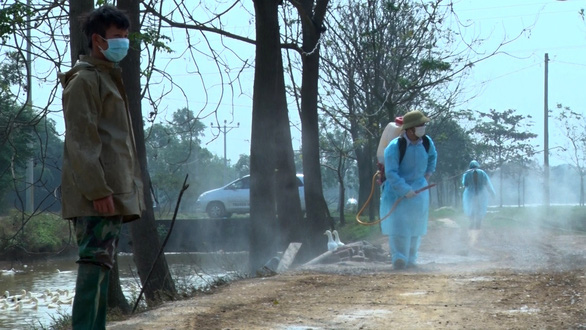The Vietnamese Ministry of Agriculture and Rural Development has requested authorities at all levels to urgently strengthen measures to curb the spread of avian flu, following a human bird flu infection detected after eight years.
Prompt actions to intensify the prevention and control of avian influenza, caused by different virus strains including A(H5), A(H5N1), A(H5N6) and A(H5N8), must be taken by local administrations nationwide as required in the Veterinary Law, the ministry urged in its recent dispatch.
The urgent request came after a human case of bird flu, caused by the A(H5) virus, was detected in northern Phu Tho Province on October 5, the first human bird flu infection after eight years without such cases across the country, the ministry stated.
The latest case has brought the total number of patients of A(H5N1) avian flu in Vietnam since 2003 to 128, of whom 64, or 50 percent, died.
So far this year, 34 avian influenza outbreaks have been recorded in 19 provinces and cities nationwide, leading to the killing of over 77,000 chickens and other poultry animals, the ministry reported.
The risk of avian influenza spread is very high, the agency warned in its dispatch.
In addition, there is a risk of bird flu virus strains such as A(H7N9), A(H5N2) and A(H5N5), among others, entering Vietnam through transportation, trade, and consumption of poultry and poultry products, including those smuggled or with unknown origin.
In localities with avian influenza outbreaks that have yet gone through 21 days, and locations with poultry testing positive for A(H5) avian influenza virus or being suspected to contract bird flu, local authorities must destroy such infected animals, declare the epidemic, tighten epidemic prevention and control measures, and take urgent steps to stop the spread of the epidemic.
Veterinary authorities in such localities must vaccinate all poultry animals in the affected areas as well as high-risk zones, and coordinate with health agencies in conducting epidemiological investigations, taking samples for testing, determining the cause of bird flu in poultry and humans, and handling the confirmed outbreaks.
The Ministry of Agriculture and Rural Development requested all local administrations to strengthen poultry quarantine, strictly control the transportation and trade of poultry and poultry products.
It is forbidden to trade and transport poultry and poultry products into Vietnam and strictly handle violations, the ministry said.
Local governments must ask people to close monitor their poultry herds for signs of bird flu and report any suspected cases to competent authorities so that timely preventive measures can be taken, the ministry said.
People are recommended not to consume food processed from sick and dead poultry or from poultry of unknown origin.
The main symptoms of bird flu can appear very quickly and include a very high temperature or feeling hot or shivery, aching muscles, headache, coughing or shortness of breath, according to the UK’s National Health Service (NHS).
After a person has been infected, it usually takes three to five days for the first symptoms to appear, and more severe complications such as pneumonia and acute respiratory distress syndrome may happen within days of symptoms appearing.
Receiving treatment quickly and using antiviral medicine may prevent complications and reduce the risk of developing severe illness, the NHS advised.
Like us onFacebook or follow us on Twitter to get thelatest news about Vietnam!




















































